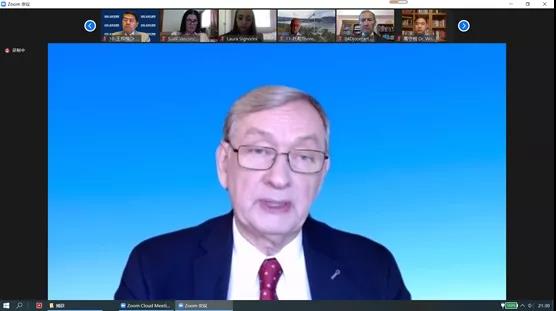发布时间:2021-05-31 作者: 达尼洛·图尔克
为了展现新疆真实形象,共同探讨新疆经济社会发展,由中国公共外交协会主办的“我眼中的新疆”国际研讨会于5月20日晚在新疆喀什“古丽的家”民宿召开。
编者按:为了展现新疆真实形象,共同探讨新疆经济社会发展,由中国公共外交协会主办的“我眼中的新疆”国际研讨会于5月20日晚在新疆喀什“古丽的家”民宿召开。斯洛文尼亚前总统、人大重阳外籍高级研究员达尼洛·图尔克(Danilo Türk)发表致辞,发言中英文实录如下:
视频时长约4分钟,以下为发言中文版:
尊敬的吴海龙先生、各位专家、女士们、先生们:
很荣幸受邀为“国际论坛:我眼中的新疆”致辞,祝贺中国公共外交协会、以及中国人民大学成功组织本次论坛。这次论坛举办得必要且及时。
多年来,新疆因其民族和宗教多样性、战略重要性、自然资源及其在中国整体转型过程中的独特发展道路而闻名于世,并成为国际关注的对象。2001年9月11日恐怖袭击后,国际社会将注意力转向安全问题。新疆与阿富汗接壤,恐怖主义已成为包括中国在内的整个国际社会关切的问题。应该记住的是,近20年来,整个国际社会都害怕伊斯兰激进组织的恐怖主义。
今天,人们从不同的角度看待新疆的局势,国际注意力主要集中在对人权的关注上。这个问题需要关注,但是必须在对事实有必要的认识并且了解背景的情况下。我认为,当批评者在缺乏对事实的充分了解的情况下发表言论,或者当他们为了特定的政治时,谈人权就不适用了。
目前,我们听到的许多批评表明其对事实认识不足和存在政治偏见。政治偏见的一个极端例子是所谓的“新疆维吾尔族种族灭绝”。这些指控缺乏事实依据,是在消极地否定中国政治。我读过其中的一些文章,包括“新行战略政策研究,所”的报告。那份报告提出了强烈的指控,但没有提供任何依据。拒绝虚假妄言和未经证实的指控很重要。但这并不是说要回避讨论人权和新疆发展。在与联合国磋商中,可以充分信任的伙伴包括联合国秘书长和人权事务高级专员。中国与联合国之间的磋商正在进行,需要积极推动沟通取得进展。
同时,有必要更好地了解新疆的发展道路。中国正在进一步转型,新疆是转型的一部分。多了解这种变化是很有意思的。就新疆的政治、经济、社会和人权等各个方面进行磋商将很重要。包括发言权、教育体系、公共卫生系统以及司法和政府公共事务等方面。不应排除任何方面,也不应忽视任何新的发展。
国际方面也很重要。例如,西方军队预计在未来几个月内撤出邻国阿富汗的后果也必须考虑在内。另一方面,应评估中亚“新丝绸之路”沿线合作的成效,并充分考虑“一带一路”倡议带来的新机遇,为政策制定提供依据。只有全面和基于事实的磋商才能有助于解决目前问题,为未来创造机会。祝“我眼中的新疆”国际论坛圆满成功,感谢大家!

图尔克现场连线
以下为发言英文版
Ambassador Wu Hailong, distinguished experts, ladies and gentlemen,
I feel honoured by your invitation to contribute a few introductory remarks to the “International Forum: Xinjiang in my eyes” and I congratulate the China Public Diplomacy Association and the Renmin University of China for the initiative.
This initiative is both necessary and timely.
For many years Xinjiang has been known and a subject of international attention for its ethnic and religious diversity, its strategic importance, its natural resources and its unique path of development within the overall process of transformation of China.
Following the terrorist attacks of 11 September 2001, the international attention shifted to the issues of security. Xinjiang borders on Afghanistan and terrorism has become a matter of legitimate concern of the international community as a whole, including China. It should be borne in mind that fear of terrorism of militant Islamic groups has been – for almost two decades - shared by the international community as a whole.
Today the situation in Xinjiang is approached from a different angle. The international attention is focused mainly on the concerns about human rights. This focus is expected – but the situation must be considered with the necessary knowledge of facts and a good understanding of context.
I wish to be clear: The cause of human rights is not served well when critics speak without an adequate knowledge of facts or when they pursue a predetermined political agenda. At present we hear much critique that shows both of these faults: inadequate knowledge of facts and political bias.
An extreme example of political bias has been expressed in the allegations about what was termed “genocide of the Uighurs in Xinjiang”. These allegations lack factual basis and represent a very bad example of political negativism directed against China. I have read some of these texts, including the report of the “Newlines Institute”. That report makes strong allegations but offers no basis to its claims. It is important to reject the false claims and unsubstantiated allegations.
However, this has to be done without creating an impression of avoidance of the discussion on human rights and any other relevant aspect of development in Xinjiang. The main and most credible partner in this discussion is the United Nations, its Secretary-General and the United Nations High Commissioner for Human Rights. The communication between China and the United Nations is ongoing and progress in this communications has to be encouraged.
At the same time, there is a need to understand the development path of Xinjiang better. China is in the process of further transformation and Xinjiang is part of that transformation. It will be interesting to learn more about this change.
It will be important to discuss all the political, economic, social and human rights aspects of Xinjiang. They should include such aspects as the linguistic rights, the educational system, the public health system and the functioning of the judiciary and of public administration. No aspect should be excluded and no new development overlooked.
International aspects are important too. For example, the consequences of the expected withdrawal of Western military presence in the neighbouring Afghanistan – in a few months from now - will also have to be taken into account.
On the other hand, the effects of an intensified cooperation along the “New Silk Road” in Central Asia should be assessed and the new opportunities that are developing within the Belt and Road Initiative should be factored in the assessment and into policy making in the region.
Only a comprehensive and facts-based discussion can help addressing the problems of today and the opportunities of the future.
I wish the International Forum “Xinjiang in My Eyes” all success and I thank you for your attention.
(欢迎关注人大重阳新浪微博:@人大重阳 ;微信公众号:rdcy2013)